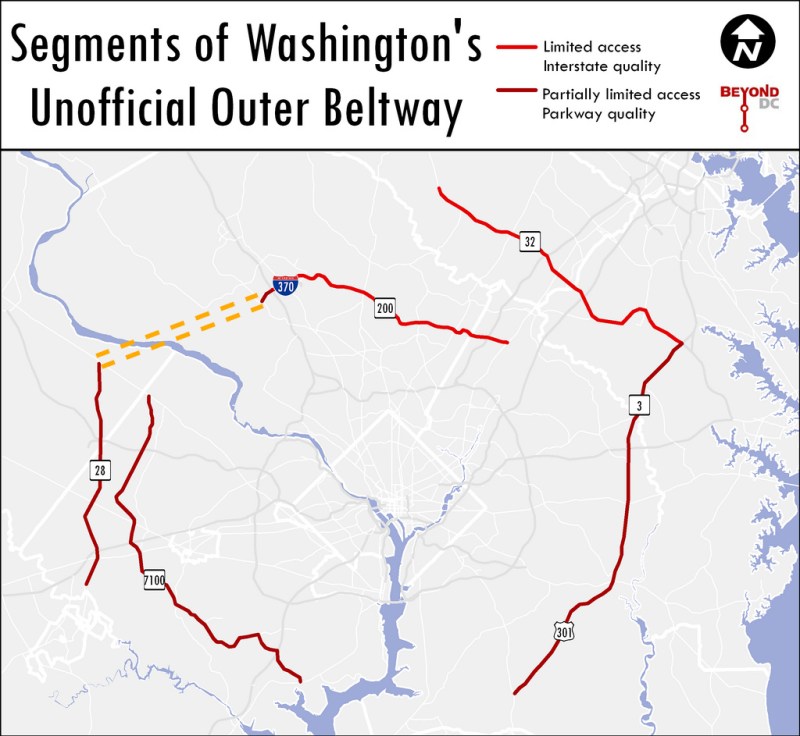Thanks to road boosters in the suburbs of Washington, DC, another highway bridge across the Potomac River -- part of an old plan for a second beltway around the nation's capital -- is still officially a possibility.
While an outer beltway was rejected decades ago, highway segments like the Intercounty Connector were built in the ensuing years, which could be connected to form a circumferential expressway. Last month, the push to extend that highway across the Potomac got a boost when the National Capital Regional Transportation Planning Board voted to study a new crossing between Maryland and Virginia.
Officials on different sides of the river are at odds over building the bridge. The state of Maryland, as well as representatives from Montgomery and Prince George's counties, oppose the project along with regional smart-growth advocates. Meanwhile, northern Virginia business and development groups are aligned with the American Automobile Association and Loudoun County legislators to support it.
Not everyone in Loudon County is for the project. The nexus of local legislators and developers has some residents concerned, particularly after a county board of supervisors meeting earlier this summer relied almost exclusively on the Northern Virginia Transportation Alliance, a business-backed pro-highway group, for its information.
“I'm not questioning [the Board of Supervisors] ethics or integrity at all, but when the only information you're getting is from developers, I don't know how you make a good decision,” county resident Diana Bendit told the Loudoun Times-Mirror.
The regional board's vote doesn't necessarily move the bridge closer to construction, since the metropolitan planning organization can't bind jurisdictions with its decisions, but it has helped reanimate the mistaken belief that suburb-to-suburb highways will cure the Washington region's traffic.
On the Virginia side, the bridge would likely serve as a northern extension of Route 28, a circumferential highway in the Fairfax County suburbs that's already effectively a beltway beyond the Capital Beltway. In addition to the new crossing, widening Route 28 has been in NVTA's sights for years.
It's also an issue that motivates local politicians, including Danica Roem, a Democrat challenging 11-term Republican state legislator Bob Marshall. While Marshall's anti-transgender "bathroom bill" motivated Roem, a transgender woman, to jump in the race, she's making widening Route 28 the centerpiece of her campaign. WUSA-9 conducted an interview with Roem behind the wheel of her car yesterday, with the headline, "Transgender candidate just wants to get rid of traffic."
"You could make history," the reporter tells Roem from the back seat.
"Yeah, when I finally fix Route 28, that will be historic," Roem shot back.
As long as political hopefuls like Roem see more highways as the solution to traffic -- despite ample evidence to the contrary -- we'll continue to have zombie projects like the new Potomac crossing shambling onward in obscure regional planning meetings, waiting for someone to get into office and fund them.





